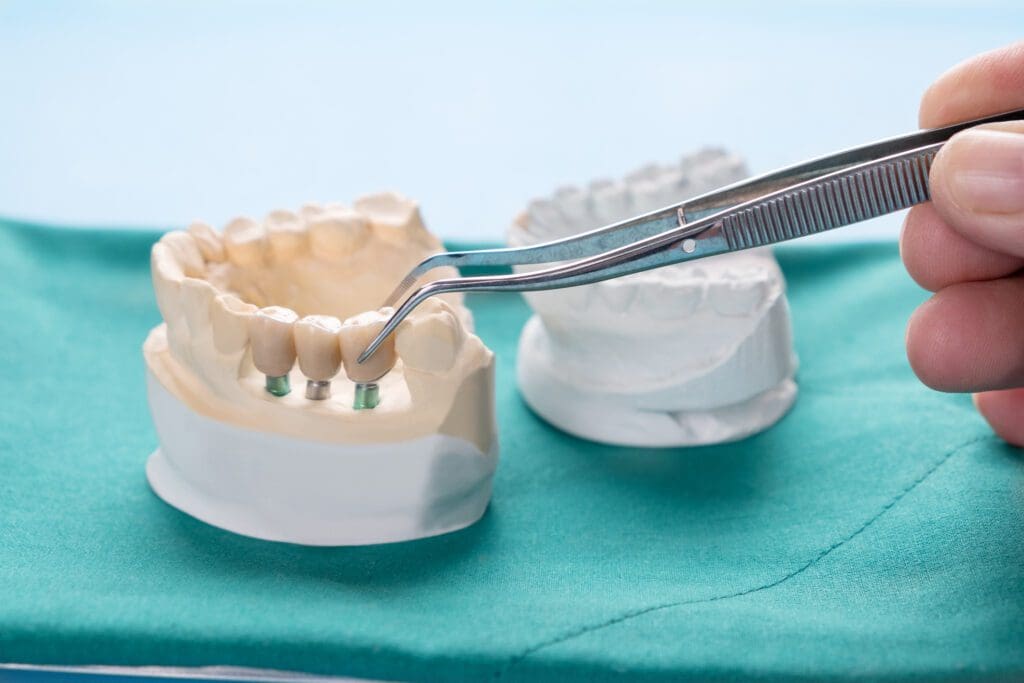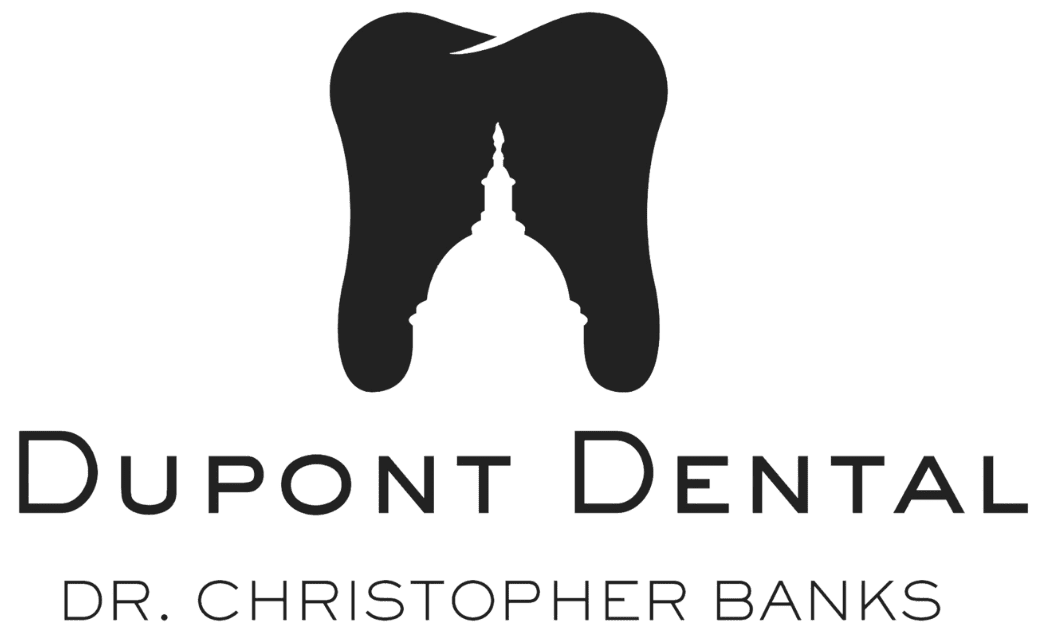Are you missing consecutive permanent teeth? A bridge may be right for you. Dental bridges “bridge the gap” left by missing teeth with false teeth that look and feel natural. Bridges are restorative dental treatments that blend with the natural smile and renew bite function. Our dental bridge treatment at Dupont Dental in Washington, DC, helps patients feel confident in their smiles.
Also known as a fixed bridge, a dental bridge consists of a pontic and abutments. Abutments act as the support to keep the bridge in place. Typically, natural teeth covered by crowns or dental implants provide support. The pontic is the restoration itself.
A bridge can replace one to four consecutive teeth. Bridges use high-quality metal and porcelain material for long-lasting replacement teeth.

What Can Dental Bridges Do For Me?
Dental bridges and similar restorations offer many benefits for patients with missing teeth. A custom-made dental bridge can:
- Restore the ability to chew and speak properly
- Maintain face shape and structure
- Help distribute bite force properly by filling in gaps from missing teeth
- Keep remaining teeth in their proper position
- Reduce the risk of gum disease and tooth decay
If you have missing teeth and feel discomfort when biting and chewing, it’s time for a dental restoration. Replacing missing teeth with a durable restoration can prevent problems like shifting teeth.
We will only recommend a traditional bridge if your natural teeth are healthy enough to support your restoration. In addition, a bridge may be the proper treatment if you only have one row of missing teeth.
We will recommend partial dentures for patients with rows in different areas of the mouth. Partials may seem similar to bridges, but bridges only replace one row of missing teeth. If a bridge is too long, it can compromise the stability of your new teeth.
Types of Dental Bridges
Common types of bridges include traditional and Cantilever bridges. For a traditional bridge, the dentist creates a crown for the tooth on each side of the missing tooth. Then, the dentist places the fake tooth or pontic between the crown-capped teeth. This is the most common bridge; dentists use ceramics or porcelain fused to metal (PFM).
Dentists use cantilever bridges when adjacent teeth are on a single side of a missing tooth gap. Cantilever bridges are best in the front of the mouth because they place more pressure on other teeth.
Implants can also secure a bridge without support from other teeth. Dental implants are titanium posts a surgeon places in the jaw bone. They act as replacement tooth roots to secure a restoration like a bridge.
What are the Benefits of Implant Bridges?
Dental implants provide many benefits over traditional options. Implant-supported bridges:
- Preserve Natural Teeth: With implants, we do not need to prepare healthy teeth for a bridge. Instead, the implant post will replace the missing tooth root.
- Support the Jaw Bone: After you lose natural teeth, you naturally lose more of your jaw bone over time. Because implants fuse with the jaw bone, they support the jaw, surrounding gums, and remaining natural teeth. Alternatively, a traditional bridge lies on the gums. You can experience facial sagging without support from your natural jaw bone.
- Last Longer: While dental bridges traditionally use adjacent teeth for support, implants offer a longer-lasting alternative. Implants ensure bridges last longer because the implant posts are permanent. Once the posts integrate with your natural jaw bone, they will stay there forever.
The best candidates for dental implants have healthy teeth and gums and enough jaw bone for support. We can recommend gum disease treatment, root canal therapy, extractions, and grafting before implant treatment.
Dental Bridge Treatment in Washington, DC
A traditional dental bridge uses support from dental crowns. During this treatment, a dentist first prepares the natural teeth on either side of the tooth gap. Reshaping these teeth ensures the crowns fit properly.
Then, the dentist takes impressions to send to a lab and provides a temporary restoration. Once the final bridge is complete, the dentist bonds the bridge in place.
While a traditional fixed bridge works for many patients, it involves preparing natural healthy teeth. However, traditional bridge treatment costs less and takes less time than implant treatment.
Implant Bridge
We work with local oral surgeons to provide dental implants to secure dental bridges. A surgeon will place the implant posts in the jaw bone. Over 3 to 6 months, the implants fuse with your jaw bone to create a stable foundation for your bridge.
At your next visit, we will place the abutments or the pieces that connect the implants to the bridge. We will also make impressions for your final restoration. As your gums heal, lab technicians will fabricate your custom-made bridge. Finally, Dr. Banks will place the permanent restoration once the dental implants are stable.
How to Care For A Bridge
After you receive your dental bridge, it will take to get used to your new bite. At first, you can eat softer foods. Avoid hard, crunchy, or chewy foods. Then, you can gradually reintroduce more foods. If you get an implant-supported bridge, you will restore most of your natural bite function.
Additionally, you can brush your false teeth just like natural teeth. Gently brush with a soft-bristled toothbrush and use non-abrasive toothpaste to prevent bacterial buildup and keep your smile clean.
Floss threaders and water flossers are beneficial for removing food or bacteria from beneath the bridge. A floss threader helps pass floss around bridgework. Water flossers use a strong spray of water at different pressures to clean your mouth.
Continue to schedule routine visits in our office. At these visits, we will check the fit of your bridge. If needed, we can make adjustments to traditional bridges.
Patient Review
Frequently Asked Questions
How does a dental bridge impact the surrounding teeth over time?
A dental bridge typically protects your surrounding teeth by keeping them stable and preventing them from shifting. But it does put extra pressure on the teeth supporting the bridge. Over time, this added pressure can sometimes cause extra wear or increase the risk of decay, especially if you don’t maintain good oral hygiene. Regular dental checkups and careful cleaning will help ensure your surrounding teeth stay healthy.
Can a dental bridge help prevent further tooth loss?
Yes, dental bridges fill the space left by missing teeth, keeping neighboring teeth from drifting out of place. By stabilizing your bite, bridges also reduce stress on remaining teeth, decreasing the risk of future problems. Maintaining a proper bite alignment makes your entire mouth healthier and stronger.
How do I clean under a dental bridge to prevent plaque buildup?
To clean under a dental bridge, use special floss threaders or interdental brushes designed specifically for bridges. Regular floss can’t reach these areas well, so specialized tools help effectively remove food debris and plaque. Adding an antimicrobial mouthwash to your routine can further reduce plaque and bacteria. Good cleaning habits significantly extend your bridge’s lifespan.
Are there any food restrictions with a dental bridge?
Generally, you can eat most foods comfortably with a dental bridge, but avoiding very sticky or extremely hard foods is wise. Caramel, taffy, nuts, or ice can put too much stress on the bridge or loosen it over time. Eating carefully protects your bridge from damage and keeps your mouth comfortable. We’ll provide clear dietary guidelines to help you adjust smoothly.
How do I know I’m a good candidate for an implant-supported bridge?
You’re likely a good candidate for an implant-supported bridge if you have multiple missing teeth and adequate jawbone density. Healthy gums and a strong jawbone are important for implant success. During your consultation, we’ll thoroughly evaluate your bone structure, oral health, and general medical history. If need be, we can discuss options like bone grafting to ensure your jaw is ready for implants.
Can a dental bridge be color-matched to my natural teeth?
Absolutely. Dental bridges are carefully color-matched to blend seamlessly with your natural teeth. We choose the shade based on your existing teeth, skin tone, and overall smile to achieve the most natural appearance possible. The goal is for your bridge to look so natural that no one notices you’ve had dental work done.
Restore Missing Teeth
Are you missing multiple permanent teeth? Contact our office for a dental bridge in Washington, DC, today at (202) 946-4720. You can also schedule a dental appointment with Dr. Banks on our website. If you have questions or concerns about bridge treatment, we’re here to help.
